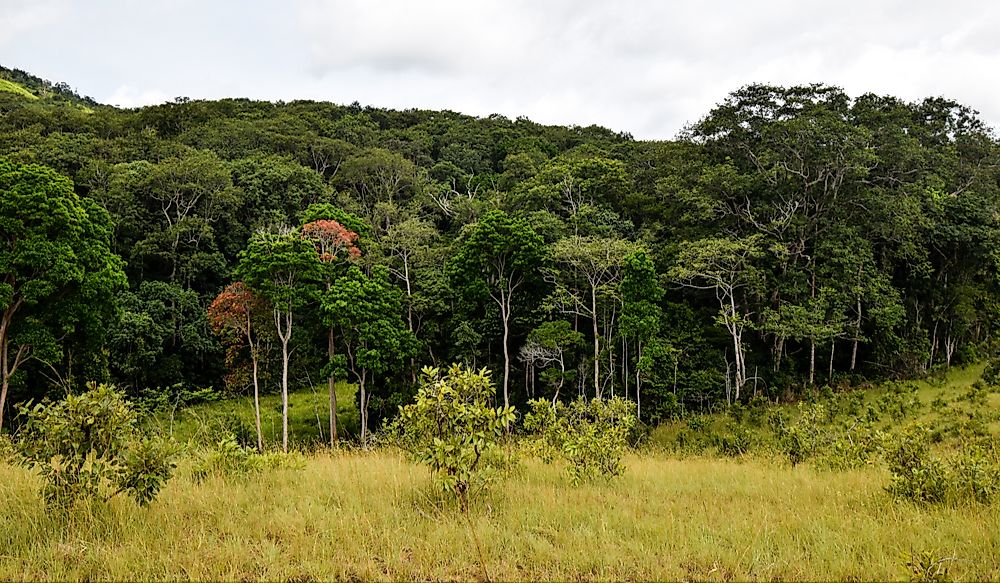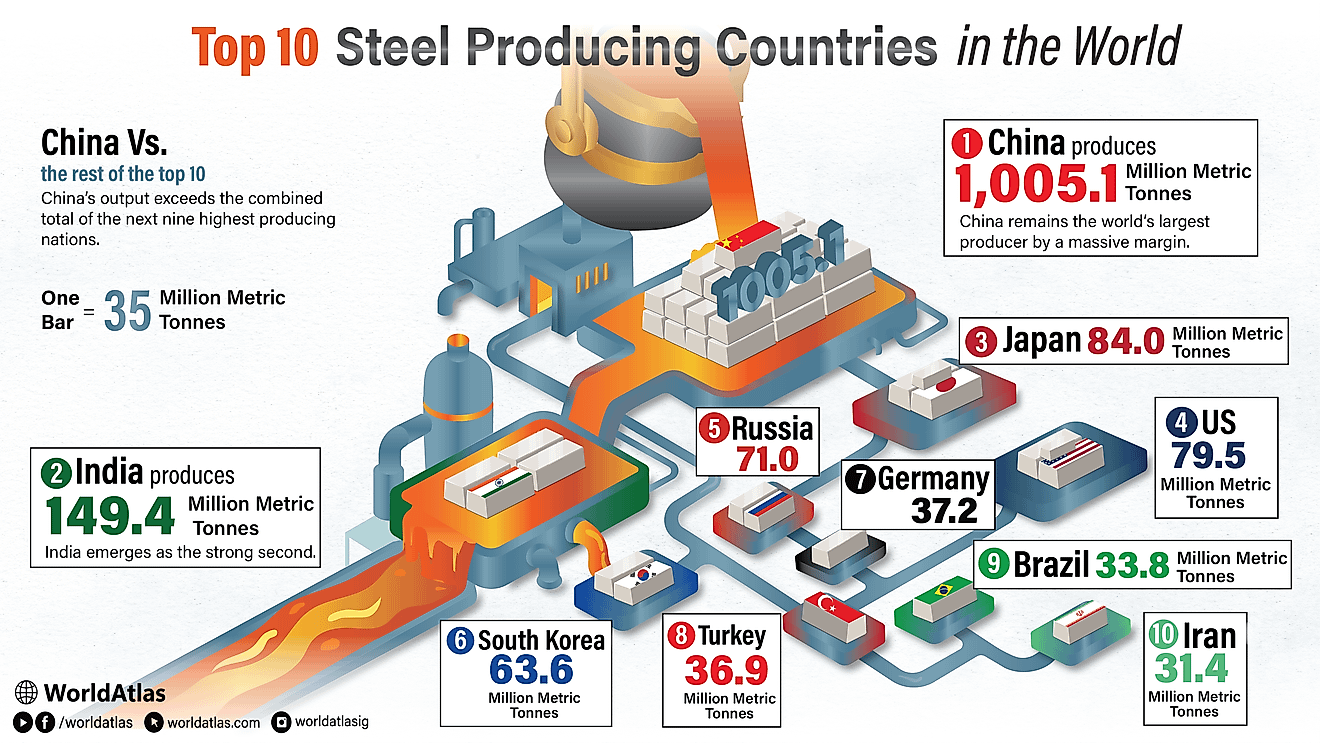What Are The Biggest Industries In Gabon?

Central African nation of Gabon spans an area of 100,000 square miles, while the population is about 2 million inhabitants. The largest city, which is also the country's capital city is Libreville. Gabon attained its independence in 1960 from France, and so far it is had three presidents. Gabon has huge deposits of petroleum and has attracted foreign investment, which has helped the country to prosper compared to other sub-Saharan African countries. Currently, the country has the 7th highest human development index and the 4th highest GDP per capita based on PPP in the region. Between 2010 and 2012, the country's GDP grew by more than 6% annually, but due to inequality in income distribution, a large part of the country’s population is still poor. According to the 2010 estimates Gabon had a GDP of $22.5 billion, and in 2015, the GDP growth rate was 3.9% while in 2016 it grew by 2.1%. The GDP per capita in 2010 was estimated at $14,600. The economy of Gabon is heavily reliant on its natural resources with the leading industries being agriculture, forestry, petroleum, tourism, and mining, among others.
Agriculture
Since independence, the role of agriculture as a contributor to the country's GDP has been declined because of the petroleum industry, which has been playing a significant role over the years. It is estimated that about 1.9% of the country's land area is utilized for agriculture and accounts for approximately 8% of the total GDP in the country. Agricultural imports into the country in 2004 accounted for about 19% of the total imports. The country relies on other countries in Africa and Europe for most of its agricultural and food items. In the past, agriculture in Gabon was mainly subsistence farming, and most of the crops cultivated include yams, taro, rice, corn, bananas, and manioc, among others. The government has intensified effort trying to diversify and increase the agricultural output, and it established several demonstration farms and experimental station as well as cooperatives to consolidate the rural farmers. Gabon also produces significant quantities of palm oil and the state owns about 18,500 acres of palm oil plantations found near Lambarene which had its production starting in 1986. Palm oil produced in the country in 2004 was about 6,430 and rubber is also grown in an area of about 10,600 acres of land, and it produced approximately 11,000 tons of rubber. Animal husbandry in Gabon is limited because of infestation of the tsetse fly although in the recent past some tsetse fly-resistant cows imported from Senegal for a cattle project in the country. The government is trying to reduce the country's reliance on imports of meat products, and about 490,000 acres have been set aside to establish three ranches in Lekabi, Nyanga, and Ngouine.
Forestry
Gabon has an extensive forest cover of approximately 77% of the total land area and for a long time, it has been able to supply many of the life necessities such as food and shelter. The country's forest is home to more than 400 different species of plants, and approximately 100 varieties are believed to be appropriate for industrial use. The exploitation of forest resources for commercial purposes has a long history in Gabon, and it began in 1892, but it was not until 1913 when Akoume was introduced to the outside world which is the most valuable hardwood in the country. Forestry has played a significant role in the country until 1968 when crude oil became a significant player earning the country more foreign exchange. The country has been the region’s leader in the export of wood, and the sales accounted for about 20% of raw wood exports from Africa. Forestry is now the second most important sector after petroleum in terms of export earnings, and in 2003, it earned the country about $319.24 million. Gabon produces some of the world famous hardwood trees such as mahogany, ebony, kevazingo, tigerwood, movingui, and zingana. At one point, exploitation of forest products was hampered by the inadequacy of transport infrastructure, but this has changed following the development of Ndjole Bitam Highway and Trans Gabon Railway. The government has also promoted reforestation and carrying out of selective thinning which has helped the Okoume tree species from being of over-exploited. More than 50 companies are carrying out exploration of forests in Gabon, and the government has granted concessions of forest exploitation of an area covering approximately 19,000 square miles.
Fishing
In the recent past, there has been an improvement in the fishing industry in Gabon, but it is relatively underdeveloped. The traditional fishing methods account for about two-thirds of the total fish catch in the country. The waters along the Gabonese coastal on the Gulf of Guinea have large stocks of fish, and it is estimated that the coastal areas of the country can support a total of about 15,000 tons of tuna and more than 12,000 tons of sardines every year. Initially, fishing fleets were mainly found in Libreville, but several ports were built particularly at Port Gentil where it is currently the center of industrial fleet operations in Gabon. The government was planning for a fishmeal factory, refrigerated storage facilities, and a cannery. The total fish catch in Gabon in 2003, was 44,855 tons and approximately 80% of these were from the Atlantic Ocean. Gabon has an exclusive economic zone which extends to about 200 miles into the ocean, and no foreign entity is allowed to fish in the area without the government's approval. The country does not have petrol boats, and therefore foreign trawlers, particularly from Spain and France, often trespass into this region to catch tuna.
Mining
Gabon has vast mineral deposits, and it was regarded as the richest of all the former French colonies in Africa. Besides oil, which contributes about 80% of the exports, Gabon has the largest Manganese deposit in the world and is the 4th largest producer. High-grade manganese, which is among the world's richest, are found in Moanda near Franceville. The Manganese reserves are believed to be about 250 million tons, and their metal contents are between 48% and 52%. The Moanda mine was producing about 2.5 million tons every year, and it is estimated that the mine will continue producing for the next 100 years. Other minerals which have been discovered in Gabon include diamonds, zinc, lead, lead, iron ore, uranium, phosphate, niobium, potash, and marble. Some of these minerals which are commercially exploited, the government has vested interest, and it has increased the profits accruing from the foreign companies extracting the minerals.
Tourism
Tourism in the country is still largely undeveloped, and there are several attractions which include beaches, inland fishing facilities, the ocean, rivers, and mountains. The tourists visiting the country are attracted to the Crystal Mountains National Park and the Ogooue river falls. Hunting in the country is legal in certain months, and hunters visit the country during this period. For a long time, the tourism industry was neglected in the country, and from 2000, the government has embarked on an ambitious plan to develop the industry. In 2002, the government of Gabon announced the country would set aside 10% of the land to develop national park systems as previously the country did not have any national parks that have worked with Wildlife Conservation Society. Currently, national parks cover approximately 10,000 square miles of land. The new parks are being developed for eco-tourism, and it has been applauded by wildlife conservation society as one of the bold steps by the country.
Challenges
Despite Gabon being among Africa’s richest countries in terms of natural resources, a large part of the population in the country are poverty-stricken, and it is estimated that more than one-third of the country’s citizens live below the poverty level and the unemployment rates among the young people stand between 20% and 35%. One of the main reasons for the high incidence of unemployment and poverty is due to high levels of corruption. The country ranks as the 124th most corrupt countries out of the 175 countries around the world. On the other hand, oil which has been the major source of revenue in the country has been declining in the past few years, and the country has not diversified its economy from over-reliance of petroleum.











